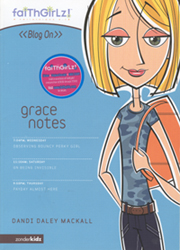|

Grace Notes
Dandi Daley Mackall
Review by Alyce Wilson
Grace Notes is part of the "Blog On"
series of books aimed at ages 8-12 with an eye towards discussing teen
issues and promoting Christian beliefs. In this book, we follow Gracie
Doe, who is keeping an anonymous blog about her observations from high
school. As might be expected, her observations are sometimes caustic
and frequently frank, so that when another student discovers her identity,
she faces reprobation from her peers.
On the surface, this topic sounds promising: discussing the dangers
of gossip. But in actuality, this book would have trouble appealing
to young people.
Author Dandi Daley Mackall demonstrates very little understanding of
Internet culture. She establishes that Gracie is paying for a domain
and Web hosting, having her computer-savvy stepsister maintain it. However,
with all of the free social networking sites available today (Facebook,
MySpace, LiveJournal, Blogger, Blogspot, to name a few), it's highly
unlikely a teenager would go to this trouble and expense to maintain
a blog.
Mackall also seems confused about how comments work on a blog, and
she has readers writing the sort of notes to Gracie they'd write to
an advice columnist. Perhaps Mackall's original idea was for Gracie
to write an anonymous advice column and then, in an effort to modernize
it, Mackall made it a blog instead. Nonetheless, she would have benefited
from researching Internet culture first.
Even more jarring, Mackall's descriptions of teen behavior and culture
seem to be rooted in her own teen years, which apparently took place
in the '80s or '90s. This is how she describes newcomer Storm Novelo:
"She was head-turning beautiful, with straight black hair to her
waist. She looked Polynesian. But she sure wasn't dressed that way.
A leather vest covered a pink T-shirt. She wore sparkly tights under
a lime green pouffy skirt. Her lime green jellies matching her green
hoop earrings. And she wore black gloves with no fingers."
In Mackall's world, such an ensemble is enough to make her instantly
popular. I'm fairly certain that in most of today's high schools, it
would earn her a seat at the outcast table.
The characters even use some slang terms that date back to the hip-hop
culture of the '90s and seem to listen to nothing recorded since the
year 2000. This would be something like if you had been reading such
a book in the '80s and the author talked about people in the school
walking around wearing go-go boots and calling things groovy. Or somebody
wearing bell bottoms and talking about the latest Abba album.
These aspects of the book are distracting, because they strain believability
to such an extent it's hard to pay attention to the message. It makes
you wonder if Mackall had any opportunity to run the book by current
teenagers to get their feedback. In the future, she should.
The book sets up a series of such books which follow different characters,
collectively known as the FaithGirlz (with a "Z," because
that's hip and "with it."). More information can be found
at the series Web
site. If the other books are anything like this one, they will have
trouble appealing to the target audience.
Rating: ** (Fair)
Zonderkidz, 2006: ISBN 978-0-310-71093-6
|